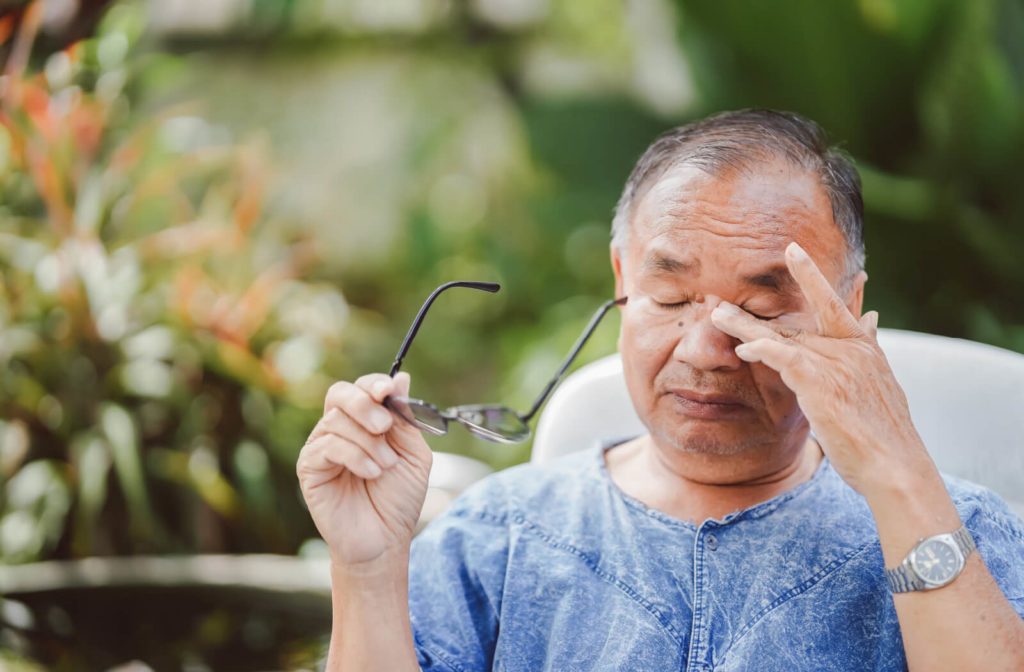You have probably heard before that a lot of water makes up our bodies, so you may have wondered, is the eye also made up of a lot of water? And if you’re dehydrated, can dehydration cause dry eyes?
Yes, dehydration can cause dry eyes. Drinking enough water throughout the day helps every part of our bodies (and eyes) function better. Staying hydrated is an overlooked part of good health, including preventing dry eye. For healthy, comfortable eyes, it is essential to get regular eye exams and drink enough water.
Hydration for Your Body & Eyes
Water is essential for several reasons, including regulating body temperature, keeping joints lubricated, preventing infections, delivering nutrients to cells, and keeping organs functioning properly, including your eyes. Hydration also enhances sleep quality, cognition, and mood.
To perform correctly and comfortably, your eyes require lubrication. If your eyes are dry, it can interfere with both visual function and comfort.
People who consume sufficient amounts of water appear to be healthier, have fewer chronic illnesses such as heart and lung disease, and live longer than those who do not drink enough fluids.
It is recommended that average females drink 11 cups of water per day and the average males drink 16 cups per day for proper hydration, however, it can be challenging to ensure you are getting the recommended amount. The good news is that not all of those cups have to be strictly water. You can get your liquids in as flavored or sparkling water, coffee, tea, fruit or veggie juices. If your beverage of choice is fruit and veggie juices, keep an eye on how much sugar hides in them.
What Is Dry Eye Syndrome?
When your tears are unable to adequately lubricate your eyes, this is called dry eye syndrome. Dry eye syndrome is a common condition—so common that between 16.7 million and 50.2 million Americans currently suffer from dry eyes.
A part of your eye called the tear film, is composed of 3 separate layers, each with its own role to play in helping keep your eyes moisturized and dust-free:
- The deepest mucus layer aids in the adhesion of the tear film to the surface of our eyes. It is the initial component of your tear film, formed by the conjunctiva.
- The lacrimal glands create the middle aqueous layer, which helps keep your eyes moist while protecting them from contaminants such as dirt.
- Your meibomian glands generate the outermost oil layer, which helps seal in the rest of your tear film. This layer keeps the tear film from drying out.
When each of these layers are in working order, they naturally help your eyes not to dry out, however some people may still experience dry eye syndrome, especially with heavy focus activities. This is why it is important to blink fully to ensure the outermost layer coats the eye in your natural oils from the meibomian glands.
Vision blurring is among the most typical signs of dry eyes. You might have dry eyes, for instance, if you blink and everything appears clearer.
Other dry eye symptoms can include:
- A stinging, burning, or scratching sensation
- Sandy or gritty eyes
- Red eyes
- Sensitivity to light
- Trouble using contact lenses comfortably
- A sensation like something is in your eye
What Causes Dry Eye Syndrome?
Dry eve can have various causes. Some of the most common risk factors for dry eye are as follows:
- Aging
- Medications such as antihistamines, antidepressants, anxiolytics, and isotretinoin
- Medical conditions like diabetes, Sjögren’s syndrome, and rheumatoid arthritis
- Meibomian gland dysfunction
- Blepharitis
- Your environment, for example, a windy day
- Hormones, hormone deficiency, and hormone replacement therapy
- Laser eye surgery
- Digital eye strain
How to Treat Dry Eye Syndrome
There are a variety of ways to help relieve dry eye syndrome, including:
Lifestyle Changes
Examining and modifying your lifestyle and daily activities may have an effect on your dry eye syndrome. Some things to consider are increasing the humidity inside your home, and staying inside on smoky or windy days. If that isn’t an option, wearing protective eyewear when outside. Taking frequent breaks from close-up activities can help, as well. When sleeping, especially during hotter weather when a fan might be blowing in your bedroom, consider an eye mask to help keep the flow of air off your eyes while you sleep. Other adjustments to the home or workplace may also be necessary.
Medications
Identifying medications that may be aiding in dry eye syndrome, as well as taking supplements like omega-3 can assist with relief from dry eye syndrome. Talk with your eye doctor about a variety of supplements that can help produce a healthy tear film.
Eye Drops
Not all eye drops work the same, therefore it is important to speak with your eye doctor about eye drops as a means of finding fast and effective relief from dry eye syndrome.
Personalized Dry Eye Treatment
The team at Dr. Bladh O.D. will take the time to get to know you and your eyes, and create a personalized treatment plan to help you see clearly and comfortably.
Schedule your next eye exam with Dr. Taylor Bladh, O.D. for compassionate, knowledgeable, and friendly eye care and dry eye treatment.



